WDI’s Performance Measurement and Improvement team, together with Good Business Lab, will conduct an ex-post evaluation of TechnoServe business accelerator programs that have operated in Chile, Peru, Guatemala, El Salvador, Honduras, Nicaragua and Panama since 2008. Using WhatsApp and phone interviews to collect data from program participants, we seek to estimate the sustainability of the programs’ impact on the entrepreneurs and their businesses.
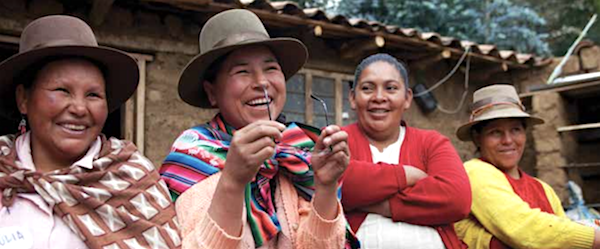
Women working with Chakipi Acceso in Peru. Image courtesy of Chakipi.
Note: The following post was co-written by Rebecca Baylor, Heather Esper and Yaquta Kanchwala Fatehi of WDI’s Performance Measurement Initiative. It was originally published on NextBillion.net, which is managed by WDI.
For many businesses and organizations, the idea of measuring their impacts is usually one of three things: scary, elusive or just plain boring. To make matters worse, evaluators have a rotten reputation for using too much annoying technical jargon. While there is some truth to these stereotypes, it doesn’t have to be all bad.
Our work demonstrates that it is possible to bridge the gap between people and metrics in a meaningful way.
In fact, our team at the William Davidson Institute recently released an impact report that demonstrates how we guided three organizations on how to demystify data collection of their social impacts. We worked with senior level leadership to develop strong surveys and data collection processes suited to their context. Perhaps more importantly, we openly discussed their measurement concerns and made explicit– dare we say, energetic– connections between their impact metrics and organizational strategy.
A key theme throughout this project was our goal to combine social and business metrics. When organizations – from enterprises to impact investors – actually track these types of combinations, which we refer to as “power couples,” they can absorb unique insights to solve key business challenges while communicating impact evidence. Through our work, we have encountered a number of social + business metric power couples that we’ve seen influence internal decision-making at organizations and improve results. Creating these power couples enables managers to more holistically harness their data to better meet business goals and increase intended impacts. For example, employee retention, an all-important business metric, may be affected by the impact that an organization has on the quality of life of their employees’ children, a social metric. This may be especially true for low- or middle-income employees.
Here are just a few common power couples that we identified during this project (detailed in the report) and others.
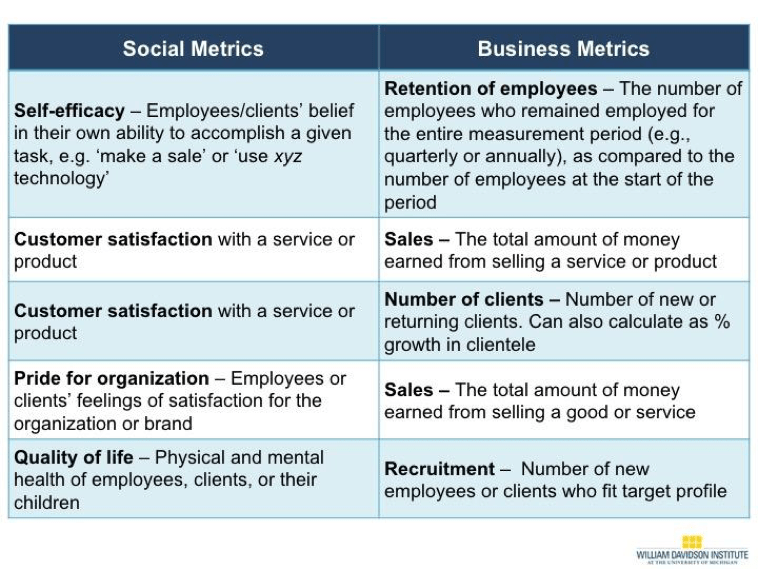
This list is just a start.
Selecting metrics takes time and patience. Indeed, finding the right metrics can be a lot like parenting. There isn’t one perfect formula and your strategy will likely evolve over time. However, we recommend businesses and investors interested in seeing social or environmental impact use some of the following strategies to make their job easier. We’re also including relevant resources to help you apply these strategies:
We hope these combinations excite you and inspire you to create a few social + business metrics of your own. Also, check out our case study for five lessons learned to accelerate successful impact measurement as an investor or investee. And if you enjoyed this post, share it, tweet it, or comment below! We’re also very curious about what social + business metric combinations have or haven’tworked for you. We look forward to hearing from you.
See? Impact measurement isn’t as scary (or as boring) as it may first seem.
Rebecca Baylor is a research associate for the Performance Measurement Initiative.
Heather Esper is the senior program manager for WDI’s Performance Measurement Initiative.
Yaquta Kanchwala Fatehi is a program manager for WDI’s Performance Measurement Initiative.
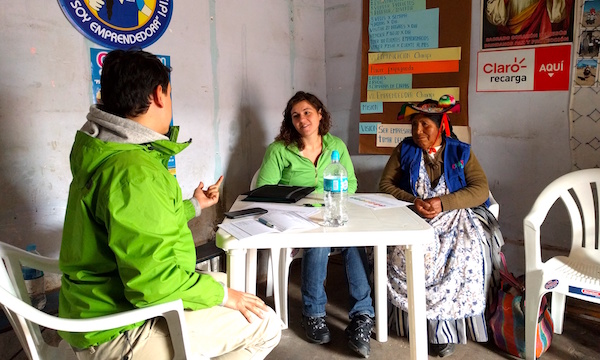
Many organizations working with small businesses in low-income countries struggle with how to separate powerful, but anecdotal, stories from true social impact that can be replicated.
The newly released WDI Impact Report, “Positive Change Through Actionable Metrics,” reviews the work of the Institute’s Performance Measurement Initiative (PMI) while pilot-testing a new framework in Brazil, Nicaragua and Peru designed to increase the impact of small, inclusive businesses and their distribution networks.
The latest report traces WDI’s work back to a 2015 Mexico conference sponsored by the Inter-American Development Bank (IDB) where WDI Senior Program Manager Heather Esper debuted the new framework, which includes a mix of standardized social and business metrics over the short and long term. There was great interest in having WDI pilot the framework with different micro-distribution organizations in IDB’s SCALA network, which brings together anchor companies, microfinance institutions, academia and non-governmental organizations to combine efforts to grow inclusive distribution networks.
Three SCALA network organizations were selected – Supply Hope in Nicaragua, Chakipi Acceso in Peru and Kiteiras in Brazil – and WDI went to work to identify indicators from the framework that would properly reflect the impact on the micro-distributors for each venture. The team also developed context-specific collection plans for gathering the necessary data. This helped the enterprises increase their data collection skills, and allowed WDI to test how much practical guidance future organizations would need if they were using the framework.
 “We are pleased to release this impact report that highlights our work with three great organizations to achieve measurement that is actually meaningful to them,” said WDI Research Associate Rebecca Baylor. “The teams we worked with deserve a lot of credit for the success of this project. So many organizations are struggling with how to measure their impacts, and these teams were willing to have in-depth conversations and reflect on their data collection practices.”
“We are pleased to release this impact report that highlights our work with three great organizations to achieve measurement that is actually meaningful to them,” said WDI Research Associate Rebecca Baylor. “The teams we worked with deserve a lot of credit for the success of this project. So many organizations are struggling with how to measure their impacts, and these teams were willing to have in-depth conversations and reflect on their data collection practices.”
As the report chronicles, WDI developed surveys for the three organizations and helped them collect and analyze the data. The work culminated in a set of recommendations for the three organizations to apply in future impact measurement activities. All three gained a better understanding of how to measure changes in the well-being of their micro-distributors.
“They were committed to building their capacity for making decisions with the data they collect,” Baylor said. “This report shares the process we went through together and will be valuable for other organizations who are striving to accomplish the same.”
It’s the second report in an ongoing series that chronicle the long-term impact WDI is having in certain sectors or geographies. The first WDI Impact Report, “Improving Business Education in the Philippines,” debuted in March 2017. It examined the Institute’s contributions to the five-year STRIDE project that focused on strengthening the science, technology, research and innovation capacity on the island nation.
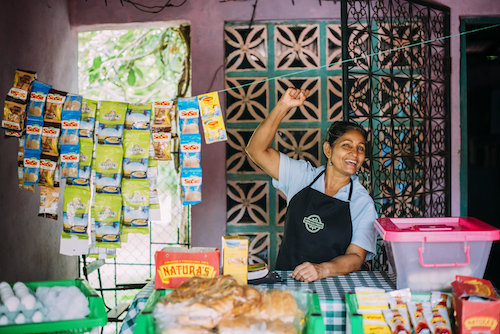
Image credit: Dani Cowan/Supply Hope
A new case study authored by WDI’s Performance Measurement Initiative (PMI) that gives advice to impact investors and investees on new and emerging ways to strengthen their impact measurement practices will be released at two major, international conferences this week.
The case, “Accelerating Measurement within Impact Investing: Five Critical Lessons,” will be shared with attendees at the Latin American Impact Investing Forum (FLII) in Merida, Mexico and the Aspen Network of Development Entrepreneurs (ANDE) “Metrics from the Ground Up” conference in Nairobi, Kenya. It tracks the WDI team as it pilot-tested its new impact measurement framework with three social enterprises in Nicaragua, Brazil and Peru, and provides recommendations to strengthen the impact measurement practices of investors as well as the enterprises they support.
“We are excited to release the case study at these conferences because the five key lessons will be familiar to many in attendance, and may provide useful insights to related measurement challenges they are facing,” said Heather Esper, senior program manager for PMI. “At the FLII event, the attendees will be impact investors or those working with them. The report, which we’re also releasing in Spanish, will be directly relatable to them and provide guidance on how to address key obstacles they encounter when trying to measure the ‘impact’ in impact investing.”
Esper will be joined at the FLII event by Diana Paez, director of WDI’s Grants Management department, to meet with potential partners who are interested in carrying out work similar to the pilot projects featured in the report.
PMI Program Manager Yaquta Kanchwala Fatehi will participate in the ANDE conference, where presenters and the audience will share experiences about different approaches to evaluation, the challenges each approach presents and building bridges between different approaches.
“We will also look to identify potential strategies to address those challenges in the different contexts where participants have done measurement and evaluation,” Fatehi said.
WDI’s case study comes at an opportune time as the call for better impact measurement grows globally. A December 2017 ANDE report found that more than half of the member organizations they surveyed have no full-time staff person dedicated to measurement. Additionally, nearly all respondents spent less than 5 percent of their annual budget on measurement.
Similarly, in a recent report by the Global Impact Investing Network (GIIN) many survey respondents said measurement issues, as opposed to management concerns, were a big challenge. In the GIIN survey, 43 percent of respondents cited significant challenges in collecting quality data, while 32 percent said aggregating, analyzing, and/or interpreting data across a portfolio was a problem for them.
For WDI’s report, the PMI team identified five valuable lessons they learned from working on the three pilots. They are summarized in the table below.
| Recommended activity | Value for Impact Investors and Social Enterprises |
| Use standard indicators, not standard measures | Contextualize data collection to ensure accurate data |
| Use a Theory of Change | Articulate impact, decide what to measure, assign indicators |
| Support M&E capacity building techniques | Speak the same language, conduct M&E without external teams, maintain sustainable M&E practices |
| Mix social outcomes with key business performance indicators | Strengthen mission and ability to scale |
| Foster a senior-level staff as a M&E champion | Help facilitate embedding of data collection into existing business processes |
Rebecca Baylor, a PMI research associate, said the recent reports highlighted the need for businesses and impact investors to reconsider and re-energize how to incorporate measurement into their own practices.
“Our team is excited to engage in that conversation by sharing experiences from our own work,” she said. “Our case study not only speaks to the struggles of individual businesses but also generalizes findings about how to incorporate measurement at scale across multiple similar enterprises.”
This case study shares five valuable lessons for impact investors and enterprises to strengthen their impact measurement practices. The case is based on experiences testing an impact measurement framework with social enterprises in Nicaragua, Brazil and Peru. The case provides recommendations to improve the impact measurement practices of investors, as well as the enterprises they support. For investors, creating a standardized set of indicators to be shared across enterprises is beneficial for aggregating data, using resources efficiently, and facilitating shared learnings across their network of investees. For investees, impact measurement can expose vulnerabilities along the value chain that affect an enterprise, such as turnover and client loyalty.
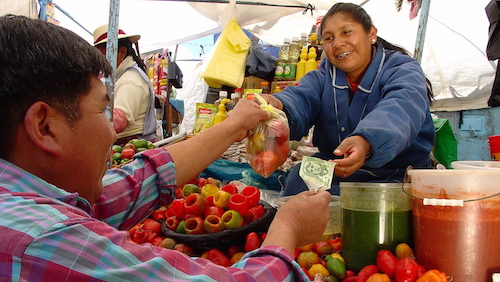
Image credit: Pro Mujer
WDI welcomes Maria Cavalcanti, president and CEO of Pro Mujer – a nonprofit finance organization that has disbursed more than $3 billion in loans to mainly women-owned enterprises in Latin America – to its Global Impact Speaker Series at the University of Michigan next month.
Cavalcanti will discuss Pro Mujer’s business model, which is centered on gender equity, and take questions from attendees beginning at 5:30 p.m., Nov. 15 in room 1560 of Blau Hall at the Ross School of Business. The event is free and open to the public.
Pro Mujer was founded by Lynne Patterson and Carmen Velasco in Bolivia in 1990 to use microloans to support women-owned businesses. Today, the organization works with entrepreneurs in that country as well as Argentina, México, Nicaragua and Peru. In 2015 alone, Pro Mujer reported providing $330 million in loans to more than 250,000 clients. Operating mainly in urban areas and regions just outside major cities, Pro Mujer also provides direct and indirect health care services through a series of centers and clinics. Services include non-communicable disease detection, dental care and ultrasound diagnostics.
 In early 2016, Cavalcanti (pictured left) was named president and CEO of Pro Mujer. She has ambitious plans to expand the organization.
In early 2016, Cavalcanti (pictured left) was named president and CEO of Pro Mujer. She has ambitious plans to expand the organization.
“As we look ahead, we are focused on amplifying our services and expanding our footprint,” Cavalcanti said in an interview with NextBillion.net, WDI’s affiliated media site focused on business solutions in low- and middle-income economies. “By leveraging partnerships and technology, we are building Pro Mujer as a platform capable of serving millions at a time; a one-stop shop for empowerment for women in the region.”
Cavalcanti holds an MBA from the University of Texas in Austin, a master of science in Information Science from Columbia University in New York, and a bachelor of arts from Universidade Federal do Ceará in Brazil. She is based in New York City, where Pro Mujer is headquartered.
Since 2015, WDI has partnered with the Inter-American Development Bank (IDB) to lead the SCALA Metrics Lab. SCALA is the largest network of micro-distributors in Latin America and the Caribbean. The Metrics Lab assists SCALA member organizations to improve their capacity for impact measurement.
As part of this work, WDI developed and tested a new framework for boosting the impact of small inclusive businesses and their distribution networks with three member organizations in Brazil, Nicaragua, and Peru between January 2016 and May 2017. These pilot projects resulted in strong, context-specific surveys for each organization and monitoring and evaluation training to the staff. The project helped ensure that each organization established appropriate processes for collecting survey data and internalizing impact measurement within their respective programs.
Want to learn more about this project? Check out this example survey or read WDI’s Impact Report: Positive Change Through Actionable Metrics. WDI also teamed up with MIT D-Lab to write a Lean Research case study about the work.
WDI finalized three project reports, one for each organization, that can be used by the social enterprises as they proceed with their impact measurement work:
WDI’s Performance Measurement Initiative is partnering with the Inter-American Development Bank (IDB) to pilot test a new framework for boosting the impact of small inclusive businesses and their distribution networks in Brazil, Nicaragua, and Peru.

Heather Esper, senior program manager of WDI’s Performance Measurement Initiative (PMI), developed the framework for IDB’s SCALA network, a platform to scale the impacts of inclusive and social business in Latin America and the Caribbean. Through SCALA, anchor companies, microfinance institutions, academia, and non-governmental organizations combine efforts to grow micro‐distribution networks based on micro-franchising models. Those models in turn provide business opportunities and access to products and services to those living at the base of the economic pyramid.
Esper first presented the SCALA metrics framework at a conference last year in Mexico which includes a mix of standardized social and business metrics over the short and long term. These indicators can be tailored to each organization in the network. Over time, the framework reveals the impact each venture is having on the micro-distributors, the people SCALA aims to help.
Following the Mexico conference, there was great interest in having WDI’s PMI team pilot the framework with different micro-distribution organizations in SCALA’s network. The goal of piloting is to test and refine the framework, as well as gauge how well these ventures improve the lives of their micro-distributors. The pilot also will inform best practices for other organizations within SCALA to adapt and implement the framework to assess their impacts in Brazil, Nicaragua, and Peru.
“SCALA would like everyone in the network to use this standardized framework,” Esper said. “We’re working closely with three organizations to pilot the framework in order to assess how easy or difficult it is for them to use. We also want to examine how it creates value for the organizations – such as informing decision-making – in order to refine the framework and develop training materials for the roll out of the framework to the rest of the network.”
The three organizations that are part of the pilot are:
Starting in May, Esper and her PMI colleagues Yaquta Kanchwala Fatehi, PMI senior research associate, and Becca Baylor, PMI research associate, adapted the framework presented in Mexico City to each organization by identifying context-specific indicators for each venture that would properly reflect the impact on the micro-distributors, and developed a data collection process plan.
The team is currently developing surveys for the three organizations, which will include a pre-test, and once complete will focus then on collecting the data, analyzing it, and writing a final report that shares the lessons learned during the pilot in addition to reporting on the findings and methodology. Esper and Baylor will travel to Peru in September to pretest the survey with Chakipi.
“We aim to compare these standardized indicators across the three organizations for the final assessment,” Esper said.
Before the pilot is completed in February 2017, Esper and Baylor will share the progress to date at the SCALA annual meeting in Cali, Colombia in October.
There are many benefits if all organizations within SCALA used the same assessment framework, Esper said.
“If all organizations within SCALA are collecting the same metrics, then learning across organizations can be improved,” she said. “There would be more systematic learning between organizations if they report these standardized indicators annually to SCALA. For instance, this work can lay the foundation for SCALA to better predict client loyalty, distributor growth capacity, as well as address vulnerabilities across the value chain. SCALA can also aggregate the findings and make a business case about the impacts of the micro-distribution model and the value of the network to the broader community.”
Tetra Pak creates smart food processing and carton packaging solutions that help make the world better, meeting the needs of hundreds of millions of people in more than 170 countries around the world. With more than 23,000 employees based in over 80 countries, Tetra Pak is committed to sustainable business practices and innovations that make food safe and available, everywhere. The student MAP team worked to create a business partnership model between private sector food manufacturers, traditional trade shopkeepers, and Base of the Pyramid consumers to enhance economic sustainability and scalability of products.